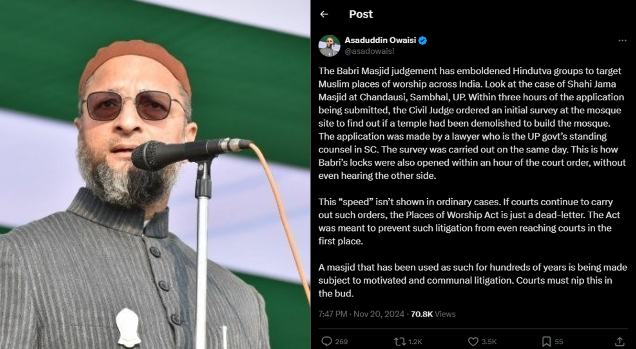Hyderabad: All India Majlis-e-Ittehadul Muslimeen (AIMIM) president Asaduddin Owaisi has found fault with the judgment of a court in Uttar Pradesh, which ordered survey of a mosque within three hours of an application being submitted with the claim that it was built by demolishing a mosque.
The Hyderabad MP was reacting to the orders of Civil Judge on Shahi Jama Masjid at Chandausi, Sambhal, Uttar Pradesh.
The Civil Judge pronounced the orders on a petition filed by a mahant who claimed the mosque was built in 1526 after demolishing a temple that stood there.
Civil Judge (Senior Division) Aditya Singh directed Ramesh Chand Raghav, whom the court appointed advocate commissioner, to carry out an initial survey at the mosque site to find out if a temple had been demolished to build the mosque. The court also directed that a report of the survey should be filed by November 29.
A few hours after the court order, the advocate commissioner and a special team formed after consultation with the managing committee of the mosque, petitioners and local officials reached the site for the survey.
The development triggered tension in Sambhal district. Police beefed up security with a large number of personnel deployed at the mosque.
In view of the tension, the local administration did not allow Rishi Raj Giri, the mahant of the Kalki Devi temple who has moved the court, to go inside the mosque with the survey team.
Owaisi feels that that the Supreme Court order in Babri Masjid case has emboldened Hindutva groups to target Muslim places of worship across India.
“Within three hours of the application being submitted, the Civil Judge ordered an initial survey at the mosque site to find out if a temple had been demolished to build the mosque. The application was made by a lawyer who is the UP govt’s standing counsel in SC. The survey was carried out on the same day. This is how Babri’s locks were also opened within an hour of the court order, without even hearing the other side,” Owaisi wrote on social media platform ‘X’.
“This “speed” isn’t shown in ordinary cases. If courts continue to carry out such orders, the Places of Worship Act is just a dead-letter. The Act was meant to prevent such litigation from even reaching courts in the first place,” he said.
“A masjid that has been used as such for hundreds of years is being made subject to motivated and communal litigation. Courts must nip this in the bud,” he added.




